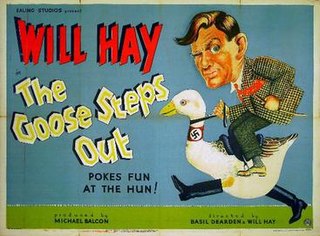
The Goose Steps Out is a British film released in 1942, starring Will Hay, who also co-directed with Basil Dearden. It is a comedy of mistaken identity, with Hay acting as a German spy and also an Englishman who is his double. It was the film debut of Peter Ustinov.

Ralph Douglas Vladimir Slocombe OBE, BSC, ASC, GBCT was a British cinematographer, particularly known for his work at Ealing Studios in the 1940s and 1950s, as well as the first three Indiana Jones films. He won BAFTA Awards in 1964, 1975, and 1979, and was nominated for the Academy Award for Best Cinematography on three occasions.
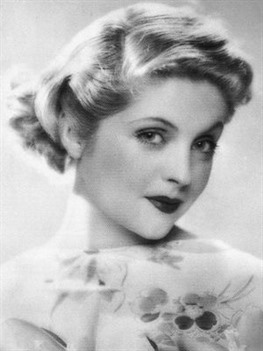
Dorothy Hyson, Lady Quayle was an American-born film and stage actress who worked largely in England. During World War II, she worked as a cryptographer at Bletchley Park.
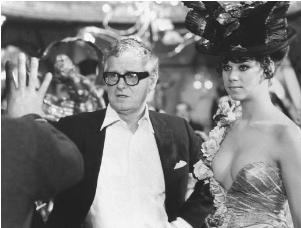
Basil Dearden was an English film director.
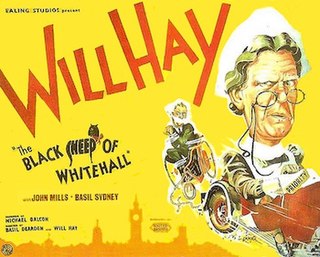
The Black Sheep of Whitehall is a 1942 British black-and-white comedy war film, directed by Will Hay and Basil Dearden, starring Will Hay, John Mills, Basil Sydney and Thora Hird in her screen debut. It was produced by Michael Balcon and Ealing Studios.
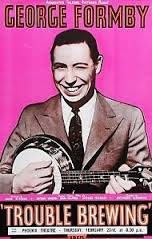
Trouble Brewing is a 1939 British comedy film directed by Anthony Kimmins and starring George Formby, Googie Withers and Gus McNaughton. It was made by Associated Talking Pictures, and includes the songs "Fanlight Fanny" and "Hitting the Highspots Now". The film is based on a novel by Joan Butler, and the sets were designed by art director Wilfred Shingleton.

Let George Do It! is a 1940 British black-and-white comedy musical war film directed by Marcel Varnel and starring George Formby. It was produced by Michael Balcon for Associated Talking Pictures and its successor, Ealing Studios, and distributed in the UK by ABFD. This was the first comedy from this studio to deal directly with the Second World War.

The Ship That Died of Shame, released in the United States as PT Raiders, is a black-and-white 1955 Ealing Studios crime film directed by Basil Dearden and starring Richard Attenborough, George Baker, Bill Owen and Virginia McKenna.
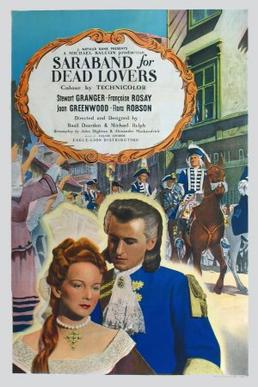
Saraband for Dead Lovers is a 1948 British adventure historical drama film directed by Basil Dearden and starring Stewart Granger and Joan Greenwood. It is based on the 1935 novel by Helen Simpson. Set in 17th-century Hanover, it depicts the doomed romance between Philip Christoph von Königsmarck and Sophia Dorothea of Celle, the wife of the electoral prince of Hanover. The saraband mentioned in the title is a type of Spanish dance.

Ronald Alfred Shiner was a British stand-up comedian and comedy actor whose career encompassed film, West End theatre and music hall.
Who Done It? is a 1956 British slapstick black and white comedy crime film directed by Basil Dearden and starring Benny Hill, Belinda Lee, David Kossoff, Garry Marsh, and George Margo. One of the last Ealing comedies, it was Hill's film debut.

Out of the Clouds is a 1955 British drama film directed by Basil Dearden and starring Anthony Steel, Robert Beatty and James Robertson Justice. It was loosely based on the novel The Springboard by John Fores and was adapted by Rex Reinits, with a screenplay by Michael Relph and John Eldridge.

The Rainbow Jacket is a 1954 British drama film directed by Basil Dearden, and featuring Robert Morley, Kay Walsh, Bill Owen, Honor Blackman and Sid James. It was made at Ealing Studios produced by Michael Balcon and Michael Relph and shot in Technicolor. The film's sets were designed by the art director Thomas N. Morahan. Location shooting took place in London and at a variety of racecourse towns including Newmarket and Epsom. The film was released by General Film Distributors as a part of a long-term arrangement with Ealing.
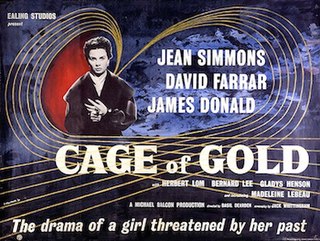
Cage of Gold is a 1950 British drama film directed by Basil Dearden, and starring Jean Simmons, David Farrar, and James Donald.
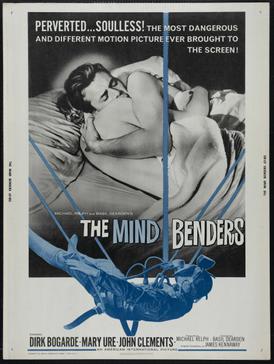
The Mind Benders is a 1963 British thriller film produced by Michael Relph, directed by Basil Dearden and starring Dirk Bogarde, Mary Ure, John Clements, Michael Bryant and Wendy Craig. Screenwriter James Kennaway turned his screenplay into his 1963 novel of the same name.
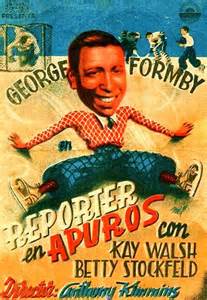
I See Ice is a 1938 British comedy film directed by Anthony Kimmins and starring George Formby, Kay Walsh and Betty Stockfeld. The film depicts the adventures of a photographer working for a London newspaper. It features the songs "In My Little Snapshot Album", "Noughts And Crosses" and "Mother What'll I Do Now".

Come On George! is a 1939 British comedy film directed by Anthony Kimmins which stars George Formby, with Pat Kirkwood and Joss Ambler in support. It was made by Associated Talking Pictures. Hal Erickson wrote in Allmovie: "Come on George! was a product of George Formby's peak movie years." It concerns the world of horse racing, and Formby, who had once been a stable apprentice, did his own riding in the film. Songs featured are "I'm Making Headway Now", "I Couldn't Let The Stable Down", "Pardon Me", and "Goodnight Little Fellow, Goodnight".

Feather Your Nest is a 1937 British musical comedy film directed by William Beaudine and starring George Formby, Polly Ward and Enid Stamp-Taylor. It contains Formby's signature tune, Leaning on a Lamp-post.

Bell-Bottom George is a 1943 black and white British comedy musical film, directed by Marcel Varnel, starring George Formby and Anne Firth. A wartime morale booster, it features the songs, "Swim Little Fish", "It Serves You Right", "If I Had A Girl Like You" and "Bell Bottom George." Future Carry On star Charles Hawtrey appears in a small role.
Ray Pitt was a British film editor who spent much of his career at Ealing Studios working on films such as the George Formby comedy vehicles Come On George! (1939) and Spare a Copper (1940) as well as on more serious productions such as the Second World War film Convoy (1940). He later worked at Hammer Films.


















